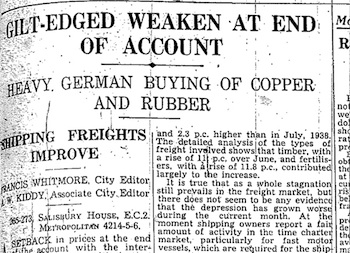Here are the web links I’ve found for 12 September 2009 through 19 September 2009, posted not-quite-automatically.
- Steak House or Gay Bar?: Can you pick the steakhouses from the gay bars, just by their names? It’s harder than you might thing!
- Greenpeace frees ocean life from Pacific longliner | Greenpeace Australia Pacific: Greenpeace’s report on their ship Esperanza “freeing tuna, sharks, marlin and an endangered sea turtle from a Taiwanese longliner”, the Ho Tsai Fa 18. Or, as I prefer to label it, Greenpeace committing piracy and endangering the lives of mariners going about their business.
- Fish Now, Pay Later | Greenpeace Australia Pacific: Darren Smith told me the article on dolphin-safe tuna wasn’t right, that Greenpeace didn’t support any kind of industrialised fishing. Here’s what Greenpeace is currently doing in the Pacific.
- The ecological disaster that is dolphin safe tuna | Southern Fried Science: By promoting “dolphin-safe tuna” — I prefer to spell it with a hyphen thusly — we’ve ended up with a system that’s unsafe for pretty much everything else.
- Meet my hot new stripper wife / Turns out the mid-life crisis is a cruel global phenomenon. Can it be stopped? | Mark Morford: Mark Morford is rapidly becoming one of my favourite writers. In this piece from February 2008 he explains a man’s mid-life crisis rather too well. And entertainingly. I’ll never be able to listen to Justin Timberlake in the same way again.
- The Lost Seasons | ABC: More details of the Australian Aboriginal six-season cycle, including a nice explanation of the system used by the Sydney basin’s D’harawal people.
- War 2.0: Political Violence & New Media | ANU Department of International Relations: I’ve been invited to attend this 2-day symposium in Canberra on 7-8 October. Now, to figure out who’s paying for it, which will be the key factor in deciding whether I can go.
- Jimmy Carter says that tea baggers hate President Obama because he's black | The Root: The former president points out a truth so self-evident you wonder how it could possibly be controversial. But controversial it is. Has modern journalism become so timid that it can’t handle the truth?
- Understanding the Telstra d-i-v-o-r-c-e | SearchNetworking.com.au: Richard Chirgwin’s backgrounder explains just how difficult it will be to separate Telstra into separate wholesale and retail divisions.
- The next generation bends over | 37signals: The makers of Basecamp, something I use every day, reckon the sale of online accounting software Mint to Intuit, the makers of Quicken and Quickbooks, is “indicative of a VC-induced cancer that’s infecting our industry and killing off the next generation”.
- Kid Cannabis | Rolling Stone: “How a chubby pizza-delivery boy from Idaho became a drug kingpin.” It’s just another product distribution business, just illegal.
- Rudd & Conroy Gambling On Mandatory Internet Censorship Working | broowery.com: An odd statistical analysis of the likelihood of stumbling across banned material online.
- ACMA Blacklists Iran Protest Video & Boing Boing: Another example of why the ACMA blacklist process is seemingly out of step with what the community might want. That’s not ACMA’s fault, they’re just implementing a dodgy policy.
- Why Sol Trujillo should be sued for stuffing up Telstra: Kohler | SmartCompany: There’s so many historical analyses of Telstra coming out this week, what with the government announcing its break-up and n’all. This one is marvellous.
- 2009 Menzies Lecture by John Howard (full text) | The Australian: “In the Australian context the adoption of a Charter or Bill of rights would represent the final triumph of elitism in Australian politics,” reckons our former Prime Minister. A fascinating read if only for its disingenuous use of political rhetoric and coded messages rather than rational argument.
- Oil Rocks | BLDGBLOG: Imagine a city of 5000 people built on stilts and causeways some 45km out into a lake. Well, it exists, and it’s called Oil Rocks, in the Caspian Sea in Azerbaijan.
- The Mushroom Tunnel of Mittagong | BLDGBLOG: A fascinating look, with photos, of a mushroom farm inside a disused railway tunnel. The tunnel itself is still government property, with the farm existing on a 5-year lease.
- Death by Information Overload | HBR.org: “New research and novel techniques offer a lifeline to you and your organization,” it says.
- The Economics of Sex Work | Core Economics: Good to see an update of knowledge since I did a little research on the sex industry for ABC Radio all those years ago.
- CHART OF THE DAY: Primetime On Facebook Is Monday To Wednesday | Silicon Valley Insider: “Social media marketers, take note. The best days to spam, erm, publish wall posts on Facebook that you want your ‘fans’ to pay attention to are Mondays, Tuesdays, and Wednesdays.”


